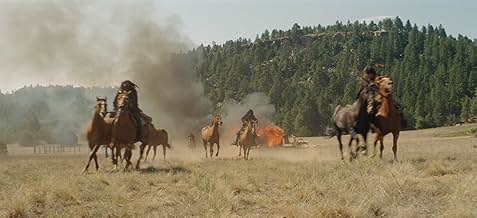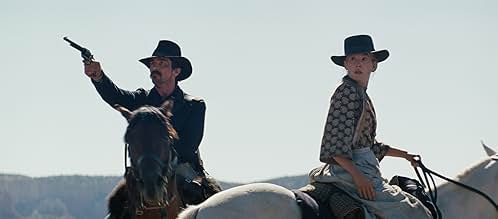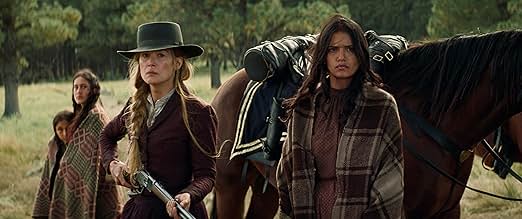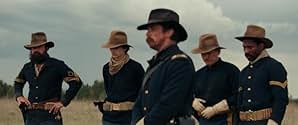In 1892, a legendary Army Captain reluctantly agrees to escort a Cheyenne chief and his family through dangerous territory.In 1892, a legendary Army Captain reluctantly agrees to escort a Cheyenne chief and his family through dangerous territory.In 1892, a legendary Army Captain reluctantly agrees to escort a Cheyenne chief and his family through dangerous territory.
- Awards
- 4 wins & 7 nominations
Gray Wolf Herrera
- Apache Man
- (as Graywolf Herrera)
Timothée Chalamet
- Pvt. Philippe DeJardin
- (as Timothee Chalamet)
- Director
- Writers
- All cast & crew
- Production, box office & more at IMDbPro
Storyline
Did you know
- TriviaThe widow of credited screenwriter Donald E. Stewart found the "Hostiles" script when moving houses. Stewart, who died in 1999, had not shipped the manuscript to any studios, and his wife was surprised to come across it. After seeing Con Tim Cuồng Say (2009) and Đi Tìm Công Lý (2013), she felt that Scott Cooper was the right man to shepherd it towards the screen.
- GoofsThere is a single African-American soldier, Corporal Henry Woodson, in an otherwise White cavalry regiment. The only Black cavalrymen in the regular army were in the 9th and 10th regiments, where only the officers were White.
- Quotes
Rosalie Quaid: Sometimes I envy the finality of death. The certainty. And I have to drive those thoughts away when I'm weak.
- ConnectionsFeatured in WatchMojo: Top 10 Failed Oscar Bait Movies of 2017 (2018)
Featured review
Many reviewing Hostiles have chosen to seize upon avenues to criticize the film. Most common is the unfortunate chronological error where the Presidential order directing the mission was signed by Benjamin Harrison. This places the story in the period of 1889 to 1893, years too late to make sense.
Such a mistake is lamentable. The time period of the story would have ideally taken place from 1879 to 1880, when Rutherford Hayes was President, and the United States had largely defeated hostile tribes in the southwest and northern plains, but would be before the establishment of the railroad lines in New Mexico. This would have necessitated the pack mule excursion to Montana. It also would have allowed sufficient time to pass, given the references to Wounded Knee (1873) and Little Big Horn (1876), for the bitter memories to start to recede and allow the reflections shown in the movie to take place.
However, a fair review of this movie must avoid getting bogged down in historical minutia and instead focus on the story, because it is very poignant.
In many ways, this movie is to be congratulated for avoiding the modern day political traps that permeate so much of entertainment today.
The opening scene is brutal and forms the core of the story. A band of renegades attack a settlement home and leave a gash of misery in their wake. But, that is the coda of what the protagonists deal with, past chapters of great violence in a collision of hostile cultures.
The isolated acts of violence that happen later are as much a cleaning up of past deeds and a completion of the catharsis of reconciliation.
This movie is an immersion into the psyche of those who carry out acts of wartime violence, in a fight for survival, and how they try to retain their sanity and civility. As the story shows, some handle it better than others. None escape without deep scars.
There is a second theme that runs throughout the movie, ignorant people at the beginning and the end, attempting to lodge their persuasion onto the protagonists. None of these men suffered the wartime violence, but instead try to insert an empty moralizing, or attempt to enact their selfish will despite the clear Presidential mandate to allow the mission to proceed.
The reporter at the start of the film is silenced through humiliation. The second group at the end of the film meets a more lasting end. And at the end, we are left with shared misery among the few survivors, who try to bravely go on with what is left good to cling to.
Christian Bale is masterful in this movie. It is sad that his performance was not properly recognized.
Ultimately, this is a story of redemption, and in that regard it mirrors what took place over generations in America. A clash of survival ending with one side defeated, while both sides had to reconcile the shared experience of brutality. It avoids political finger-pointing, and in that regard strikes the proper degree of respect for both sides in this American struggle. It is a welcome addition to Hollywood's collection of period movies.
Such a mistake is lamentable. The time period of the story would have ideally taken place from 1879 to 1880, when Rutherford Hayes was President, and the United States had largely defeated hostile tribes in the southwest and northern plains, but would be before the establishment of the railroad lines in New Mexico. This would have necessitated the pack mule excursion to Montana. It also would have allowed sufficient time to pass, given the references to Wounded Knee (1873) and Little Big Horn (1876), for the bitter memories to start to recede and allow the reflections shown in the movie to take place.
However, a fair review of this movie must avoid getting bogged down in historical minutia and instead focus on the story, because it is very poignant.
In many ways, this movie is to be congratulated for avoiding the modern day political traps that permeate so much of entertainment today.
The opening scene is brutal and forms the core of the story. A band of renegades attack a settlement home and leave a gash of misery in their wake. But, that is the coda of what the protagonists deal with, past chapters of great violence in a collision of hostile cultures.
The isolated acts of violence that happen later are as much a cleaning up of past deeds and a completion of the catharsis of reconciliation.
This movie is an immersion into the psyche of those who carry out acts of wartime violence, in a fight for survival, and how they try to retain their sanity and civility. As the story shows, some handle it better than others. None escape without deep scars.
There is a second theme that runs throughout the movie, ignorant people at the beginning and the end, attempting to lodge their persuasion onto the protagonists. None of these men suffered the wartime violence, but instead try to insert an empty moralizing, or attempt to enact their selfish will despite the clear Presidential mandate to allow the mission to proceed.
The reporter at the start of the film is silenced through humiliation. The second group at the end of the film meets a more lasting end. And at the end, we are left with shared misery among the few survivors, who try to bravely go on with what is left good to cling to.
Christian Bale is masterful in this movie. It is sad that his performance was not properly recognized.
Ultimately, this is a story of redemption, and in that regard it mirrors what took place over generations in America. A clash of survival ending with one side defeated, while both sides had to reconcile the shared experience of brutality. It avoids political finger-pointing, and in that regard strikes the proper degree of respect for both sides in this American struggle. It is a welcome addition to Hollywood's collection of period movies.
- kenstallings-65346
- Jul 2, 2018
- Permalink
- How long is Hostiles?Powered by Alexa
Details
- Release date
- Country of origin
- Official sites
- Languages
- Also known as
- Hostiles: Violencia americana
- Filming locations
- Angel Fire, New Mexico, USA(exterior scenes)
- Production companies
- See more company credits at IMDbPro
Box office
- Budget
- $39,000,000 (estimated)
- Gross US & Canada
- $29,819,114
- Opening weekend US & Canada
- $22,849
- Dec 24, 2017
- Gross worldwide
- $35,669,017
- Runtime2 hours 14 minutes
- Color
- Sound mix
- Aspect ratio
- 2.39 : 1
Contribute to this page
Suggest an edit or add missing content








































